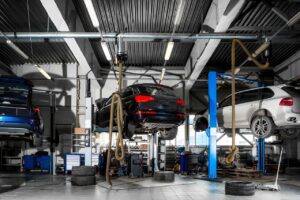Houston’s hot climate, congested traffic, and long commutes put a lot of stress on vehicles. As a result, many drivers in the area face a variety of auto repair issues. While some problems are unavoidable due to wear and tear, many common repairs can be prevented with regular maintenance and smart driving habits.
Here’s a breakdown of the most frequent car repairs in Houston and how you can avoid them.
- Brake System Repairs
Common Issues:
Houston’s stop-and-go traffic puts significant strain on the brake system. Drivers often report issues such as worn brake pads, warped rotors, and leaking brake fluid.
How to Avoid It:
- Get your brakes inspected every 10,000 to 15,000 miles.
- Avoid riding the brakes or making sudden stops whenever possible.
- Flush and replace brake fluid every two years.
- AC and Cooling System Repairs
Common Issues:
Due to Houston’s hot and humid climate, air conditioning failures are especially common. Over time, AC compressors, refrigerant lines, and cooling fans can wear out.
How to Avoid It:
- Run your AC for at least 10 minutes every week, even in winter, to keep components lubricated.
- Replace coolant as recommended in your owner’s manual.
- Have the system checked annually before summer.
- Battery Replacements
Common Issues:
Houston’s heat can shorten the life of a car battery. Batteries often fail without warning, especially if they’re older than three years.
How to Avoid It:
- Get your battery tested during regular oil changes.
- Check for corrosion on the terminals and clean them if needed.
- Don’t leave electrical systems (like lights or music) running with the engine off.

- Transmission Problems
Common Issues:
Automatic transmissions can wear out over time due to heavy traffic and extreme temperatures. Common signs include slipping gears, delayed shifting, and transmission fluid leaks.
How to Avoid It:
- Change your transmission fluid every 30,000 to 60,000 miles, depending on vehicle type.
- Don’t tow loads beyond your vehicle’s capacity.
- Address leaks or strange noises immediately before they become serious problems.
- Engine Overheating
Common Issues:
Hot weather combined with low coolant levels, a broken water pump, or a faulty thermostat can cause your engine to overheat.
How to Avoid It:
- Check coolant levels regularly.
- Replace your radiator hoses and belts as they wear out.
- Don’t ignore the temperature warning light—pull over and shut off your engine.
- Check Engine Light Diagnoses
Common Issues:
This warning light can indicate a range of problems, from a loose gas cap to serious engine trouble.
How to Avoid It:
- Don’t ignore the light. Get a diagnostic scan done as soon as possible.
- Ensure your gas cap is tightly secured.
- Keep up with scheduled maintenance to prevent sensor and system failures.
- Suspension and Steering Issues
Common Issues:
Houston’s roads, especially during rainy seasons, can be tough on suspensions. Potholes and uneven surfaces often lead to worn shocks, struts, and alignment issues.
How to Avoid It:
- Drive carefully and avoid potholes.
- Get your alignment checked once a year or if the vehicle pulls to one side.
- Replace shocks and struts as needed (usually every 50,000 miles).
- Oil Leaks and Oil Changes
Common Issues:
Overdue oil changes can cause sludge buildup, leading to engine damage. Leaks from worn gaskets or seals are also common.
How to Avoid It:
- Change your oil and filter every 3,000 to 7,500 miles, depending on oil type.
- Check for dark spots under your parked car.
- Address any burning oil smells immediately.
- Flat Tires and Blowouts
Common Issues:
Extreme heat, debris on the road, and underinflation often cause tires to fail. Blowouts can be dangerous at high speeds.
How to Avoid It:
- Check tire pressure monthly.
- Rotate tires every 5,000 to 8,000 miles.
- Replace tires when tread is worn below safety limits.
- Exhaust System Problems
Common Issues:
Rust and moisture can corrode the exhaust system, especially in vehicles parked outdoors. Faulty oxygen sensors are another common issue.
How to Avoid It:
- Listen for loud noises or rattling from underneath the vehicle.
- Get annual inspections to catch early signs of damage.
- Replace the oxygen sensor as recommended by your vehicle manufacturer.
Bonus Tip: Stay on Top of Regular Maintenance
Many drivers in Houston put off routine services because they’re too busy or don’t think it’s necessary. But regular maintenance is the best way to prevent expensive repairs down the road. Follow your owner’s manual, and make a checklist of the following:
- Oil and filter changes
- Brake inspections
- Tire rotations and pressure checks
- Battery tests
- AC service
- Coolant level and condition
- Transmission fluid service
- Belt and hose inspections
Final Thoughts
Living and driving in Houston presents unique challenges for your vehicle, but with a little attention and regular maintenance, you can avoid the most common auto repairs. Staying proactive not only saves you money in the long run, but it also ensures that your vehicle runs reliably—no matter the season or traffic condition.
Being aware of the issues most Houston drivers face allows you to make smarter decisions about how you care for your car. Schedule regular checkups, drive mindfully, and don’t wait for problems to get worse. Your car—and your wallet—will thank you.









